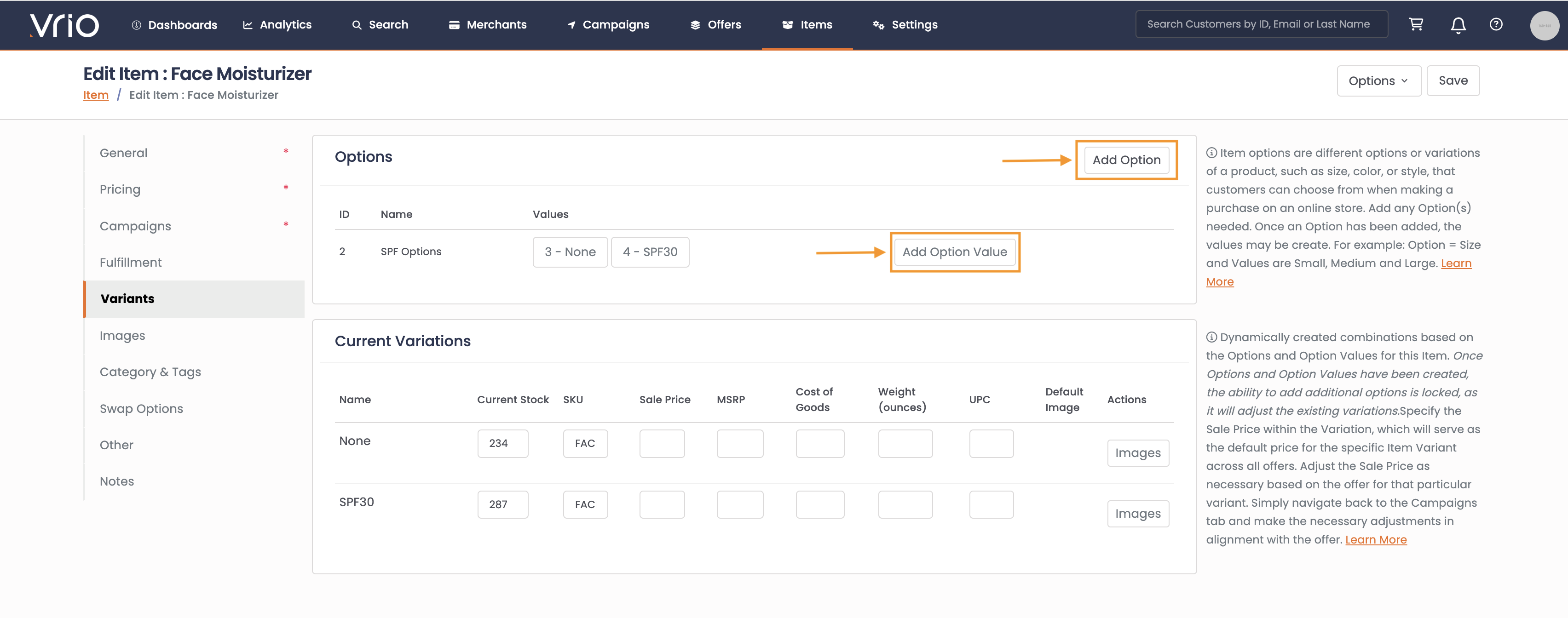Item Variants
Item variants are different options or variations of a product, such as size, color, or style, that customers can choose from when making a purchase on an online store.
Vrio allows sellers to list these variants separately, making it easier for customers to select their preferred option. Customers can choose the desired variant from a drop-down menu or a selection of checkboxes on the product page. The price, availability, and any specific details or images associated with each variant can vary.
By offering item variants, sellers provide customers with a wider range of choices and cater to different preferences and needs. It allows sellers to showcase their products more comprehensively and accommodate a diverse customer base.
Adding Item Variants
In Vrio, variants are associated with a base item. If the base item has variants, the configuration for those variants will be located in the Variant tab.
To add an Item Variant
-
Create the Item or Select an existing Item
-
Navigate to the Variants tab
-
Select Add Option
-
-
Name the Option* - The characteristic to choose (Size)
-
Add Option Value*-_Option value would be the specific attribute (S,M,L)
-
Add Variation Details:
- Stock
- SKU
- Sale Price
- MSRP
- Cost of Goods
- Weight (oz)
- UPC
- Images
-
Hit Save
Variant Price
The Sale Price used for the Item variation is what will be used as the default price. This will be used across any Campaign and Offer combination that the Item Variant is associated with.
Editing the price of the Variant
You can sell all variants for the same price - for example you may not want to charge a different price for a shirt size. However if it is a bottle size such as Travel Size or Full Size 10oz, you will want to charge different prices.
Similarly, if you want to have a Subscribe and Save option where a one-time purchase has a different price than a monthly subscription, you may edit that variants default price and adjust based on the Offer plan they select.
How to edit the price
- Select the Item
- Navigate to the Sales Channel tab
- Select the Offer you wish to update
- On the fly out, update the pricing per variant to be used for that specific Offer
- Hit Submit
Offering variants with different pricing is a common pricing strategy used by businesses to appeal to different segments of customers or to encourage customers to choose a specific option based on their needs or preferences.
By offering different variants with different pricing, businesses can capture a wider range of customers with different budgets, preferences, or needs, while also generating more revenue from customers who are willing to pay more for additional product or benefits.
Custom Variant Pricing Based on Offer
Customize your customers options even more by adding unique pricing on specific variants based on the Offer, or billing frequency, that the customer chooses.
For example, you are offering an item variant as a one-time purchase or subscription, you can add a subscribe and save option by setting the price for the subscription to be x% off of the default price.
Variant Fields Defined
| Field Name | Description | Visible to Customer |
|---|---|---|
| Options | Specific attributes or characteristics of the product, such as size, color, style, or any other distinguishing feature. | Yes |
| Option Value | The specific attribute of that Option, such as Small, Medium or Large | Yes |
| Stock | Stock refers to the inventory of goods that a company holds for sale or production purposes. This will be used if Deny when out of stock, is active | |
| SKU | Stock Keeping Unit. It is a unique code or number assigned to a specific product or item in a sellers inventory. SKUs are used for inventory management and tracking purposes, allowing businesses to identify and differentiate between different products, variations, or versions within their stock. | No |
| Sale Price | The default price that this SKU should be sold for. This will be used across all offers that are utilized for this Item. | Yes |
| MSRP | MSRP stands for Manufacturer's Suggested Retail Price. It is the price recommended by the manufacturer or producer of a product as the suggested selling price to retailers or consumers. The MSRP serves as a guideline and reference point for pricing, but actual prices in the market may vary due to factors such as competition, discounts, and promotions. | Yes |
| Cost of Goods | Cost of goods refers to the expenses incurred by a company or business to produce or acquire the goods that are sold to customers. This is used across all profitability reporting | No |
| Weight (ounces) | Physical mass or heaviness of the specific SKU. This is used to calculate Shipping cost based on Shipping Profiles, if profile is weight based. | No |
| UPC | Universal Product Code. It is a standardized barcode system used to identify and track products | No |
Updated 4 months ago

